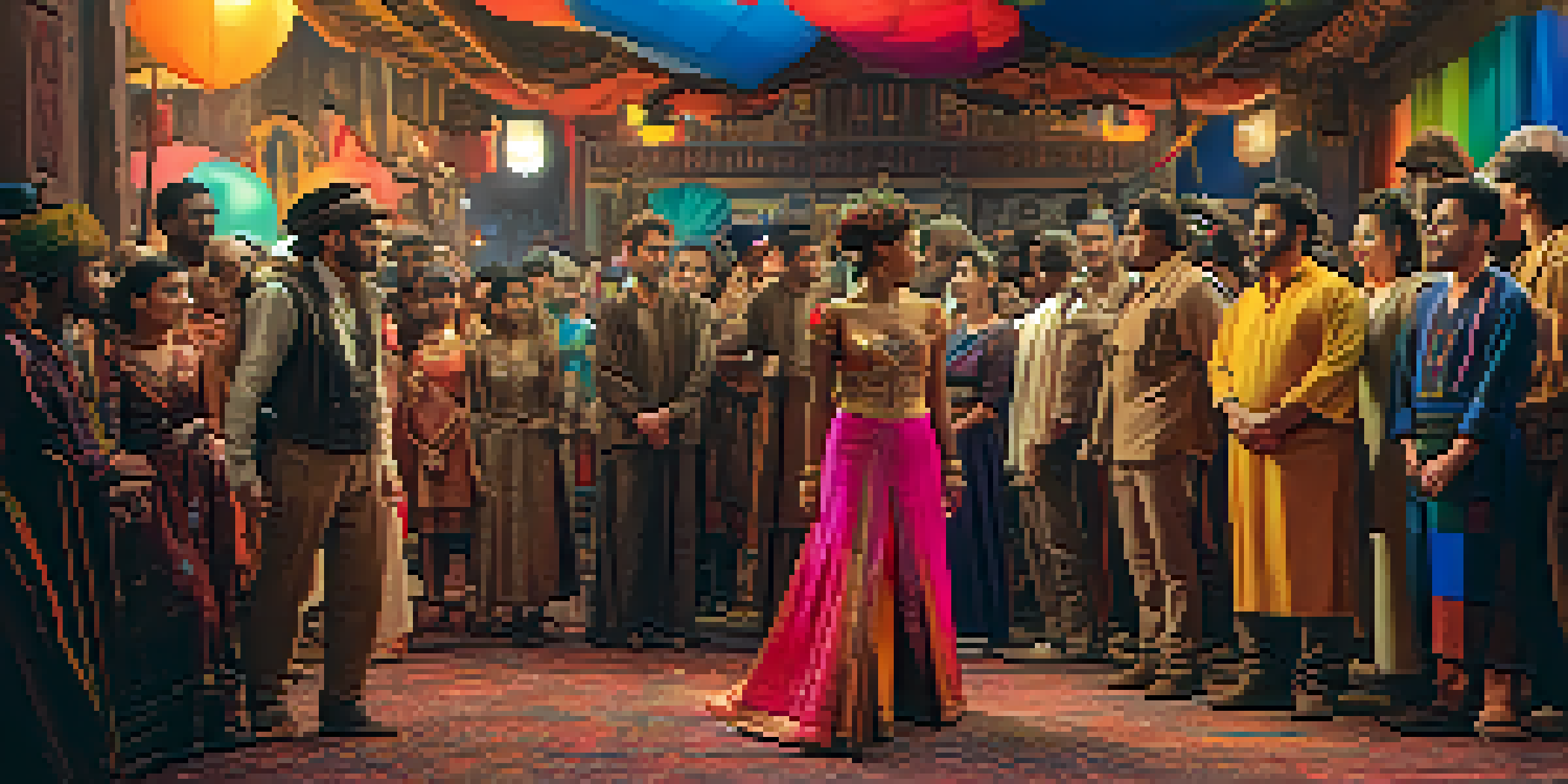The Impact of Diversity Initiatives on Film Industry Success

Understanding Diversity Initiatives in Film
Diversity initiatives in the film industry refer to programs and practices that promote inclusivity across various demographics, including race, gender, and sexual orientation. By actively seeking diverse talent both in front of and behind the camera, the industry aims to create stories that resonate with a broader audience. These initiatives are not just about representation; they also enrich the narrative landscape, allowing for more authentic storytelling.
Diversity is not a trend; it's a powerful tool that can elevate storytelling and connect with audiences on a personal level.
For instance, films like 'Black Panther' and 'Crazy Rich Asians' have demonstrated how inclusive casting can lead to box office success, showcasing stories that reflect the experiences of underrepresented groups. This shift towards diversity has sparked conversations about the importance of representation in media, as audiences increasingly demand stories that reflect their realities. Ultimately, these initiatives aim to break the mold of traditional filmmaking, inviting a variety of perspectives.
Moreover, diversity initiatives can enhance the creative process itself. When filmmakers from different backgrounds collaborate, they bring unique viewpoints and experiences that can lead to innovative storytelling. This creative synergy often results in films that not only entertain but also provoke thought and discussion, fostering a deeper connection with viewers.
The Business Case for Diversity in Film
Investing in diversity initiatives is not just a moral imperative; it makes sound business sense as well. Research has shown that films with diverse casts and crews can outperform their counterparts at the box office. According to a study by the USC Annenberg Inclusion Initiative, films with more diverse teams tend to achieve higher financial returns, proving that inclusivity can directly impact profitability.

Moreover, a diverse film industry attracts a wider audience demographic, which translates into increased ticket sales and streaming subscriptions. As global markets continue to expand, films that resonate across cultural boundaries can capture the attention of international audiences, leading to greater financial success. This broad appeal highlights the importance of creating films that reflect the diversity of the world we live in.
Diversity Enhances Storytelling
Inclusive casting and diverse perspectives lead to richer, more authentic narratives that resonate with broader audiences.
By prioritizing diversity, studios can also enhance their brand reputation. Audiences today are more conscious than ever about the values of the companies they support. A commitment to diversity can foster loyalty and trust, encouraging viewers to choose films from studios that prioritize representation and inclusivity in their projects.
Case Studies: Successful Diverse Films
Several films have successfully harnessed the power of diversity to achieve critical and commercial success. As mentioned earlier, 'Black Panther' not only showcased a predominantly Black cast but also celebrated African culture and heritage, resonating deeply with audiences worldwide. The film became a cultural phenomenon, breaking box office records and earning numerous accolades, including several Academy Award nominations.
The future of cinema will not be defined by the stories we tell, but by who we allow to tell them.
Similarly, 'Crazy Rich Asians' made waves as the first Hollywood film in over 25 years to feature an all-Asian cast. Its success was a testament to the demand for authentic representation, as audiences flocked to see a story that reflected their experiences. This film not only entertained but also sparked conversations about the importance of diverse narratives in mainstream media.
These case studies illustrate that diversity is not just a trend; it's a powerful tool that can elevate storytelling and connect with audiences on a personal level. When filmmakers embrace diverse perspectives, they open the door to stories that are rich, complex, and deeply relatable.
Challenges Facing Diversity Initiatives
Despite the positive impact of diversity initiatives, the film industry still faces significant challenges. One of the main obstacles is the persistent presence of systemic bias, which can hinder opportunities for underrepresented groups. Many decision-makers in Hollywood are still predominantly from privileged backgrounds, leading to a lack of understanding and support for diverse talent.
Additionally, there can be pushback against diversity initiatives, with some arguing that they compromise artistic integrity or lead to tokenism. It's crucial for the industry to navigate these concerns carefully, ensuring that diversity efforts are genuine and not merely a box-ticking exercise. By fostering a culture of inclusivity, the film industry can overcome these hurdles and create a more equitable environment for all.
Diversity Drives Financial Success
Films with diverse casts and crews tend to outperform their counterparts at the box office, proving that inclusivity can boost profitability.
Moreover, measuring the success of diversity initiatives can be challenging. While box office numbers provide some insight, they don't capture the full impact of representation on audiences and culture. Establishing clear metrics for success will be essential for evaluating the effectiveness of these initiatives and ensuring they continue to evolve.
The Role of Audiences in Promoting Diversity
Audiences play a crucial role in driving the demand for diversity in the film industry. As viewers increasingly seek out films that reflect their experiences and values, studios are compelled to respond. Social media has amplified this demand, allowing audiences to voice their opinions and hold companies accountable for their representation practices.
Platforms like Twitter and Instagram have become spaces for fans to celebrate diverse films and advocate for change within the industry. Hashtags like #OscarsSoWhite and #RepresentationMatters have sparked important conversations about the need for inclusivity in Hollywood, pushing for greater accountability from studios and creators alike. This grassroots activism has proven that audiences can influence the narrative landscape by supporting films that prioritize diversity.
When audiences choose to support diverse films, they send a powerful message to studios about the importance of representation. Every ticket purchased or streaming view contributes to the success of these initiatives, making it clear that diverse stories matter. This collective action can inspire studios to invest more in diverse talent and narratives, ultimately enriching the film industry.
Future Trends in Diversity Initiatives
The future of diversity initiatives in the film industry looks promising as more creators recognize the value of representation. With the rise of streaming platforms, there is a growing demand for diverse content that caters to a global audience. This shift presents an opportunity for filmmakers to explore stories that reflect a wide range of experiences and backgrounds.
Moreover, emerging technologies such as virtual reality and artificial intelligence can enhance storytelling by providing new ways to engage diverse audiences. Filmmakers are increasingly experimenting with these technologies to create immersive experiences that resonate with viewers from different cultures. This innovation can further drive the demand for diverse narratives and broaden the horizons of storytelling.
Audiences Influence Diversity Demand
Viewers' growing demand for diverse stories drives studios to prioritize representation, showcasing the power of audience support in shaping the film industry.
As the industry continues to evolve, it's essential for diversity initiatives to adapt and expand. By fostering partnerships with organizations that support underrepresented talent and advocating for systemic change, the film industry can build a more inclusive future. This commitment to diversity will not only enrich storytelling but also reflect the diverse world we live in.
Conclusion: Embracing Diversity for a Brighter Future
In conclusion, diversity initiatives are not just a trend; they are crucial for the success of the film industry. By embracing diverse perspectives, filmmakers can create richer, more authentic stories that resonate with audiences worldwide. The business case for diversity is clear, as inclusive films can lead to greater financial success and audience loyalty.
However, it's vital for the industry to address the challenges that come with implementing these initiatives. By promoting a culture of inclusivity and measuring the success of diversity efforts, the film industry can continue to evolve and grow. Audiences play an essential role in this journey, as their support for diverse films drives change and encourages studios to invest in representation.

As we look to the future, it's important to remain committed to fostering diversity in storytelling. By doing so, the film industry can not only reflect the world we live in but also inspire future generations of filmmakers and storytellers to embrace their unique voices.